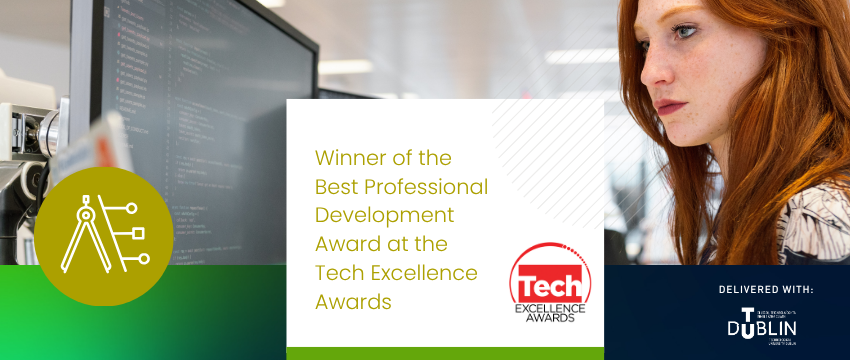MSc in Software Solutions Architecture
Build the foundations of tomorrow’s tech solutions.
Almost all industries are grappling with complex challenges such as scalability demands, the integration of emerging technologies like AI and IoT, and cybersecurity threats. To navigate this digital maze, software architects with the right skillset are essential.
The best software architects are more than just technical experts. As well as possessing well rounded skills, which include an understanding of business and technology, they require the expertise to communicate and influence multiple stakeholders, ensuring their project not only works, but aligns with the broader goals of the organisation. They bridge the gap between innovation and practical implementation, ensuring systems are resilient, efficient, and future-proofed.
Having analysed these challenges, the team at Technology Ireland ICT Skillnet, along with Technological University Dublin (Tallaght Campus), the Irish Computer Society (ICS), the International Association of Software Architects (Iasa) and members of our Industry Steering Group, developed a solution.
This 2-year part-time Level 9 Masters programme is designed to give software architects and engineers the skills, confidence, and technical capabilities needed to not just advance, but to make a significant impact in their field. You will work alongside like-minded peers and industry experts, engaging in meaningful discourse and collaborative projects.
Drive innovation, shape strategies, and guide organisations toward a better digital future, with our award-winning MSc in Software Solutions Architecture.
Who is this course for?
This programme has been uniquely designed to cater for:
- Current software architects who want to gain a recognised qualification to help them develop in their role and career.
- Graduates in related fields looking to progress into the emerging field of software architecture to increase their employment potential.
The programme will start with a 2-day workshop that will involve all students being physically present. This is seen as important to facilitate networking, experience sharing and group learning.
Lectures are held online two evenings per week, from 6.30 to 9.00pm. The lectures are primarily on Tuesdays and Thursdays. Occasionally, classes may alternate between Wednesday and Thursday to facilitate guest speakers. Lectures will be streamed live and will be available for download and offline viewing.
Some optional additional on-campus events may also be held. There are 2x examinations which are generally held on campus over the period of the programme.
Schedule
Lectures are held on two evenings per week. In the first year, the lecturers are normally Tuesdays
and Thursdays from 6.30 to 9.00 pm. Videos of the lecture are available to view afterwards.
Orientation and lectures always take place on Friday and Saturday within the last two weeks of January from 9am-5pm. The official dates will be confirmed in September 2025.
The programme has seven modules spread over Semesters 1, 2 and 3 and a major Research Project in Semester 4.
Semester 1-3:
- IT Architecture Design
- IT Environment
- Business Technology Strategy
- Human Skills for the IT Architect
- IT Architecture Quality Attributes
- IT Architecture in Practice
- Research Methods
Semester 4:
- Research Project / Dissertation
The Research Project component, to be conducted in-company and addressing a relevant real-world problem or issue, will be formulated as a research question, then executed as a project, with the outcome written up as a Dissertation of circa 15,000 words.
The Research Project will need to demonstrate a full engagement with the programme content and with relevant academic sources so that the outcome is a valid piece of research appropriate to a Masters (NFQ Level 9) qualification. TU Dublin staff and in-company members will guide and supervise the project. The Research Methods module in Semester 3 is designed to prepare and develop the participant’s ability to complete the Research Project.
This course will formally certify your status as a highly skilled, high-performing software architect, with an internationally recognised qualification.
Graduates of this programme will develop the required knowledge, skills and attributes in human dynamics, business, technology and strategy, IT Architecture, IT Quality Attributes and Environments, to support them in growing their roles as an IT/Software Architect. Graduates are also prepared to carry out applied research in topics at the cutting edge of software architecture.
This course will equip both established and aspiring software architects with:
- Informed, industry-aligned understanding of their role
- Frameworks, approaches and tools for executing software architecture tasks
- Knowledge base of current best software architectural practice and experience
- The ability to communicate effectively with a range of stakeholders
- The capacity to understand technology initiatives from a broad business perspective
- Understanding of how to make strategic technical decisions
- Internationally certified and validated academic recognition
Academic Eligibility
Prospective participants must either (a) be serving in the role of software architect, or (b) be aspiring to move into such a role. All participants must have substantial experience of IT software and systems development and implementation in team and technical leading roles. They must also have current competence to interact with development teams at a deep technical (i.e. specification and coding) level.
Applicants should have a primary degree (Level 8) in Computer Science or a cognate/science discipline or a degree with a high level of mathematics.
For candidates who do not meet this minimum entry requirement, the college operates a Recognition of Prior Learning (RPL) scheme whereby applicants may be considered based on relevant work or other experiences.
For applicants whose first language is not English, please note the English language entry requirements.
Fees
The fees for this programme are part-funded by Technology Ireland ICT Skillnet. Part-funded fees are only available to eligible* applicants.
Full course fee: €4,325 per year
Technology Ireland ICT Skillnet grant: €830 per year
Subsidised course fee: €3,495* per year
Fees are payable prior to the commencement date in both years.
Subsidised fees are only available to eligible applicants*.
*Funding Eligibility
Applicants must be working in a private or commercial semi-state organisation registered in the Republic of Ireland (Business, Consultant, Freelancer) to avail of the grant-aided fees. As a government-funded training network, we can only support those meeting these criteria with funding towards courses.
Public sector employees, non-profits, or charitable organisations that do not meet our funding criteria may apply privately for the full course fee once places are available.
Once you have received your offer of a place on the course, please be aware that we have a limited number of subsidised places available. Due to high demand, we cannot hold places without payment. To ensure fairness, priority for these places will be granted to those who have both completed full payment of the subsidised fee and are deemed eligible by the college or training provider.
Complete the Apply Now form on this page to start your application.
Please do not send any documents other than your CV to Technology Ireland ICT Skillnet when completing the form. The Technology Ireland ICT Skillnet team will confirm receipt of your application and follow up with further information.
If you have any questions on the course before making your application, please use the ‘Make an Enquiry’ button.
The following documents will be required at the second stage of the application process:
- Transcripts of your Primary Degree OR Industry Certifications.
- If you’re an international student, i.e. did third-level education in a different country where English is not the first language then we need your English Language certification. Click here for details about the English Language requirement component.
- A letter from your company confirming your current role.





